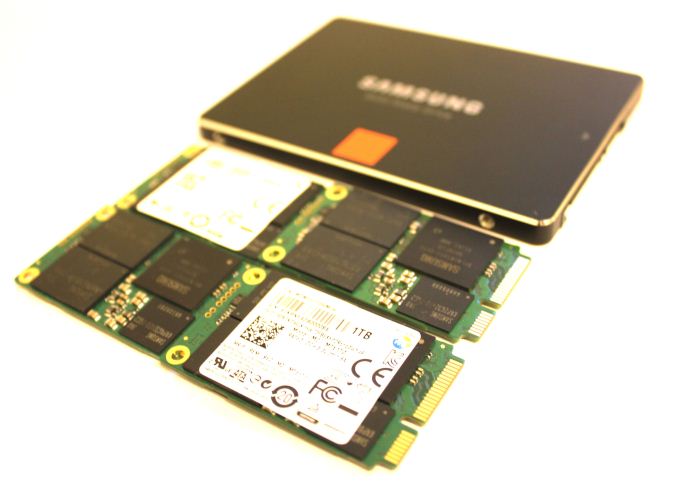Samsung SSD 840 EVO mSATA (120GB, 250GB, 500GB & 1TB) Review
by Kristian Vättö on January 9, 2014 1:35 PM ESTFinal Words
I would say the biggest market for mSATA drives right now is DIY upgrades to Ultrabooks and other laptops with existing mSATA SSDs (or in some cases there's an empty mSATA slot). One of the most common complaints I hear about Ultrabooks is their limited storage capacity because many got used to the thinking that even $400 laptops have 500GB of storage. Nowadays most SSD-only systems ship with a 128GB SSD, which to be honest is a significant downgrade if you've gotten used to having at least half a terabyte in your laptop. The rise of cloud services has reduced the need for internal storage (most smartphones and tablets only have 8-32GB) but there are still plenty of scenarios where cloud is out of question. Take photographers as an example -- if you shoot large RAW photos, uploading/downloading them constantly doesn't sound like the best idea especially if you happen to live in a region where unlimited Internet is only a dream.
In the past if you wanted a bigger mSATA SSD, your options maxed out at 256GB (Mushkin's Atlas was the only exception, though you had to sacrifice performance for capacity). For hybrid systems (i.e. PCs with a small SSD for caching and a hard drive for storage) 256GB can cut it since the storage needs are fulfilled by the hard drive but if you have an SSD-only system 256GB may not be much of an upgrade over the 128GB that most systems ship with.
Four EVO mSATA take roughly the same space as one 2.5" drive
That is where the EVO mSATA excels in. With capacity of up to 1TB and an impressive performance result, it is truly a no-compromise mSATA SSD. mSATA is no longer a tradeoff between capacity and size, the EVO mSATA provides everything that the 2.5" EVO does but at ~1/4 the footprint. Add that to the fact that the EVO mSATA is built on the same platform as the 2.5" EVO, which has been one of our highest recommendations since its release. What Anand said in his 840 EVO review's final words suits here perfectly as well: "To say that I really like the EVO is an understatement".
Samsung continually amazes me in the SSD space. The EVO mSATA is yet another proof that their engineering is state-of-the-art and almost one step ahead of others. I cannot wait to see what else Samsung has in their sleeves for 2014, and we will analyze with a critical eye as always, but the start is great for sure.












65 Comments
View All Comments
wingless - Thursday, January 9, 2014 - link
1TB in that small package?! 2014 is really the FUTURE! This will turn my laptop into a monster.Samus - Thursday, January 9, 2014 - link
What's interesting is it isn't even worth considering these models UNLESS you go with 1TB, because all the other capacities aren't nearly price competitive with the competition. Fortunately for Samsung, there is no competition at the flagship capacity, so they could charge whatever they want.Kristian Vättö - Friday, January 10, 2014 - link
Like I said, those are MSRPs, not street prices. The MSRPs of the 2.5" EVO are only $10 less but as you can see, the street prices are significantly lower.TheSlamma - Wednesday, January 15, 2014 - link
it's the presentjaydee - Thursday, January 9, 2014 - link
Hard for me to justify the 48-55% price premium of the 840 EVO over the Crucial M500 (250 GB and 500 GB versions). At some point "faster" SSD's hits diminishing returns in "real life" scenario's...fokka - Thursday, January 9, 2014 - link
"I wasn't able to find the EVO mSATA on sale anywhere yet, hence the prices in the table are the MSRPs provided by Samsung. For the record, the MSRPs for EVO mSATA are only $10 higher than 2.5" EVO's, so I fully expect the prices to end up being close to what the 2.5" EVO currently retails for."meaning: the prices will go down, once broadly available.
emn13 - Thursday, January 9, 2014 - link
On the desktop? Given the lack of power-loss protection, the 840 EVO is probably a worse choice even at comparable prices.But on mobile? Sudden power loss is less likely (though background GC complicates that picture), and the 840 EVO's lower power draw, particularly in idle, extends battery life.
I'm pretty sure I'd opt for the 840 EVO on a battery-powered device, assuming the price difference isn't too great.
nathanddrews - Thursday, January 9, 2014 - link
If it helps your decision at all, I just upgraded my wife's notebook (Lenovo Y580) from a 2.5" 250GB Samsung 840 (not pro) to an mSATA 240GB Crucial M500 (and then put the stock 750GB HDD back in) and it's phenomenal. The M500 feels snappier, but that could just be due to restoring the existing Windows image onto a clean drive. Either way, it was a great $130 upgrade.If you have a free mSATA port on your notebook, it's a no-brainer to get an SSD for it.
Solid State Brain - Thursday, January 9, 2014 - link
The trim behavior might be something introduced with one of the latest firmwares. I have a Samsung 840 250GB and I recently tried doing some steady state tests. After hammering it with writes, trim does not restore performance immediately. However with normal usage/light workloads, or keeping the drive idle, however, it will eventually (in a matter of hours) return back to the initial performance.I guess this is some kind of strategy to improve long term wear/stability/write endurance. Maybe some sustained write protection kicks in to avoid writing immediately at full speed after trimming the free space.
Solid State Brain - Thursday, January 9, 2014 - link
PS: where's the edit button to fix typos/errors, etc, when needed?? :(